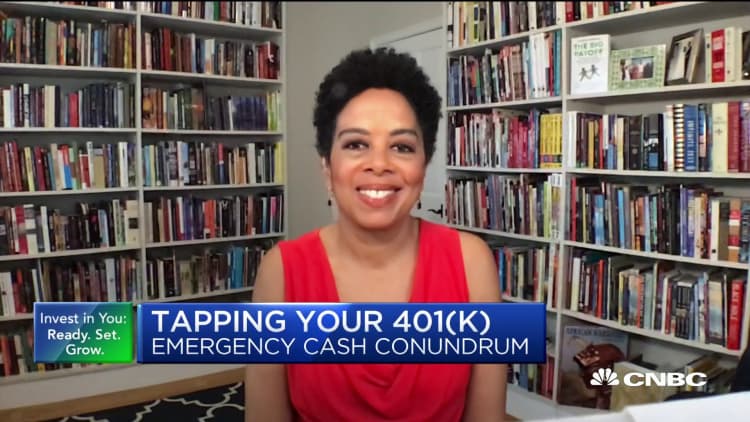Over a decade after the Great Recession ended, nearly half of millennials believe their finances are still recovering from that economic downturn. And that's before accounting for the latest setbacks being felt by the coronavirus pandemic.
At least, that's what a recent report revealed when TD Ameritrade conducted an online poll of over 1,000 U.S. adults aged 24 and older with at least $10,000 in investable assets. Although this is based on a smaller sample size and drawn from an online poll, the data gathered provides an interesting snapshot.
Of course, it's not surprising that millennials feel like they're still making up for lost time. Americans between the ages of 18 and 34 at the time of the recession suffered double-digit unemployment rates for almost six years following the start of the downturn in 2007, according to a 2014 report from the nonprofit Young Invincibles.
Between unemployment and repressed wages, Young Invincibles estimates that the last recession cost young workers more than $22,000 in lost earnings each. And that's on top of many taking out student loans, as well as experiencing stagnating wages and increasing costs of living.
Those types of losses have lasting impacts on financial plans, including retirement. Prior to the pandemic, about 59% of millennial respondents in TD's survey (defined here as ages 24 to 38) regularly contributed to their retirement savings, but about 41% did not. In fact, millennials were evenly split between believing and being skeptical that their retirement plans were on track financially.
The pandemic may also have impact on retirement savings
About 70% of millennials say they believe the coronavirus pandemic will have an impact on their plans for retirement, with about 19% saying that effects of Covid-19 will be severe, according to TD's survey. Already, nearly one in three millennials say that they've had to withdraw money from their retirement savings, both 401(k)s and individual retirement accounts, because of the pandemic.
"For some younger Americans, this was the first time that they experienced such disruption, and millennials in particular, many burdened by student loans and high living expenses, were hit by the financial effects of the pandemic," says Dara Luber, senior manager of retirement at TD Ameritrade.
Source: TD Ameritrade's Covid-19 & Retirement Survey
While the how and when of retirement will always be personal to your own financial situation, Luber says it's critical that you understand how withdrawing or adding to your retirement account may impact your long-term financial goals. Especially since about 21% of millennials are considering taking a withdrawal from their 401(k) and another 24% are eyeing their IRAs.
If you're in that situation, consider why you're planning to take that step, Eric Roberge, a certified financial planner and founder of Beyond Your Hammock, tells CNBC Make It. Are you reacting emotionally? If so, it might be time to reconsider. "Rarely is it a good idea to take money out of your retirement accounts, and many people do have other means of getting through a financially tough time," Roberge says.
So before you take money from retirement accounts, ask yourself: Have you pared down your budget to just the essentials? Are you stripping out everything but needs-based spending? "If the answer is no, then that's your first course of action... not dipping into retirement savings," Roberge says. "Cutting your spending isn't fun, but it also doesn't need to be forever."
Already dipped into retirement savings? Make a plan
If you've already withdrawn money from your retirement accounts, which Congress made easier earlier this year by allowing retirement plans to waive the typical 10% early-withdrawal penalty, then it's time to make a plan to repay that money.
When it comes to 401(k)s, every plan has its own rules and policies in terms of paying back the money, whether you took it as a loan or a withdrawal, says Lazetta Rainey Braxton, a New York City-based CFP and co-CEO at 2050 Wealth Partners. It's extremely important that you work closely with your HR manager or your plan administrator to get clarity on what your options are to repay those funds, she says.
With a 401(k) loan, there may already be a process in place to make automatic repayments right from your paycheck. But if you take a coronavirus-related withdrawal or a hardship withdrawal from your retirement accounts, you'll need to keep track of repaying it on your own. If that's the case, it may make sense to reach out to your HR manager or 401(k) plan provider to set up automatic monthly contributions.
Source: TD Ameritrade's Covid-19 & Retirement Survey
And stay on top of the tax issues around 401(k) loans and withdrawals. The CARES Act allows loan repayments to be deferred until 2021, after which you'll have five years to repay the loan. When it comes to withdrawals, Americans have three years to either pay the income taxes due on the withdrawal or to pay back the money and not owe taxes on it. But it's best to pay off that money as soon as you can, Rainey Braxton says.
Looking ahead, this is a good time to reset and reassess what your priorities are for the future. And understand that having emergency savings needs to be a part of the plan going forward, so start to take steps today to build up that cushion, Rainey Braxton says. "Savings are what you need to survive situations such as this."
Check out: The best credit cards of 2020 could earn you over $1,000 in 5 years
Don't miss: From credit cards to payday loans: where to turn when you're short on cash



